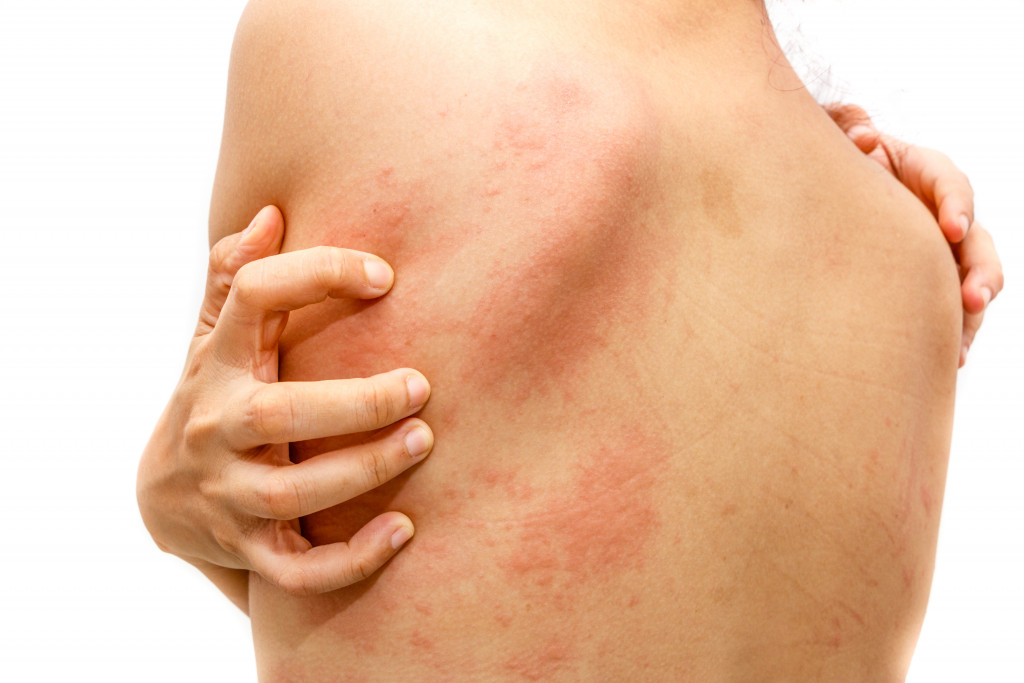Do you find yourself experiencing redness, itching, and dryness on your skin? It’s possible that the culprit could be right in your own home. Skin irritations can be caused by various things, ranging from dust mites to fragrances. Here are a few tips to help you avoid skin irritations at home:
Tip #1: Wear sunscreen indoors
The sun’s UV rays can cause skin damage even when you are indoors. Make sure to wear sunscreen with an SPF of 30 or higher every day, regardless of whether you plan on going outside or not. Many skincare products now include SPF protection, so look for those if you don’t want to apply sunscreen separately each day.
Additionally, limit your time in direct sunlight, as UV rays can be stronger during certain times of the day. If possible, stay indoors during peak sun hours (between 10 AM and 3 PM) or find shade when spending time outdoors.
Tip #2: Change your sheets frequently
Dust mites are microscopic bugs that feed on the dead skin cells that build up over time on our sheets and pillows. Change your sheets every seven to ten days to prevent them from causing rashes or other skin sensitivities. Wash them in hot water (at least 130°F) and use a mild detergent that contains no scents or dyes. This will help keep the dust mites away and ensure your skin stays healthy.
You should also consider buying sheets made of hypoallergenic materials such as cotton or bamboo. These are less likely to cause skin irritation, so they’re a great choice if you experience frequent sensitivity or rashes in your sleep.
Tip #3: Clean your furniture
Your furniture can also play a role in causing skin irritation. Dust mites and other allergens often accumulate on your couches over time. To avoid these irritants, vacuum thoroughly once or twice a week. When dusting, use an allergen-preventing cleanser that won’t trigger your skin sensitivities.
You should also consider employing the help of an upholstery cleaning service provider. They can deep clean your furniture and remove any allergens, dust mites, or other irritants affecting your skin. They will also be able to use special cleaning agents and equipment that will safely remove stains from your furniture without damaging the fabric.
Tip #4: Avoid artificial fragrances
Fragrances found in many household products can cause skin irritation for some people. Try using fragrance-free products such as laundry detergents, soaps, and fabric softeners whenever possible to avoid this problem. If you must use scented products, opt for essential oils instead of synthetic fragrances, which can often be more irritating to the skin than natural ones.
In addition, try to be mindful of the ingredients that go into your skincare products. Look for those that are free from synthetic fragrances or other artificial chemicals and opt instead for natural alternatives such as jojoba oil or aloe vera gel. These tend to be safer for sensitive skin and will help keep you from experiencing irritation or rashes.
Tip #5: Keep moisturizing
Dry air can cause your skin to become dry and flaky over time if it is not properly moisturized. Invest in a good quality moisturizer and make sure to apply it daily after washing your face or taking a shower/bath. This will help keep your skin hydrated and protected from environmental factors like wind or cold weather that might otherwise dry out your skin further.
If you find that your skin is still getting irritated even when using a moisturizer regularly, try a product that contains ceramides. These lipid-rich molecules can help strengthen and protect the barrier function of your skin, reducing sensitivity and helping to prevent future problems from occurring in the first place.
Tip #6: Identify allergens in your home

If you notice any signs of allergic reactions on your skin, such as redness or itching, after coming into contact with certain objects or materials in your home, it is important to identify what is causing these reactions so that you can avoid them in the future.
Common allergens found in homes include pet dander, dust mites, mold spores, pollen, perfumes/fragrances from cleaning products/air fresheners, etc., and even certain fabrics like wool or polyester, which may trigger an allergic reaction due to their synthetic nature.
Protecting yourself against skin irritations doesn’t have to be complicated. All it takes is some simple changes around the house! By changing out bedding frequently, wearing sunscreen indoors daily, avoiding artificial fragrances where possible, keeping your skin well hydrated throughout the day by moisturizing regularly, and identifying allergens in the house—you’ll be one step closer towards having healthier-looking skin! So go ahead and give these tips a try today!
